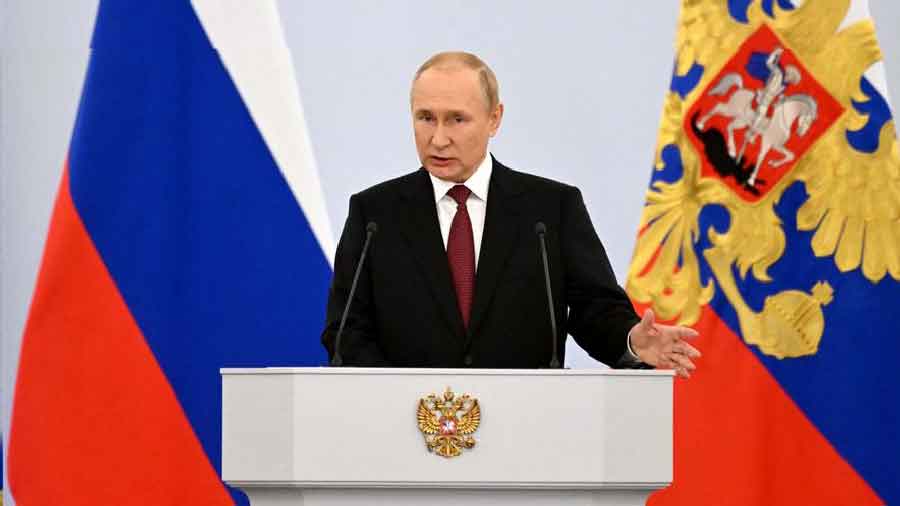For weeks after Russian troops forcibly removed Natalya Zhornyk’s teenage son from his school last fall, she had no idea where he was or what had happened to him.
Then came a phone call.
“Mom, come and get me,” said her son, Artem, 15. He had borrowed the school director’s cellphone.
Natalya made him a promise: “When the fighting calms down, I will come.”
Artem and a dozen schoolmates had been loaded up by Russian troops and transferred to a school farther inside Russian-occupied Ukraine.
While Natalya was relieved to know where he was being held, reaching him would not be easy. They were now on different sides of the front line of a full-blown war, and border crossings from Ukraine into Russian-occupied territory were closed.
But months later, when a neighbour brought back one of her son’s schoolmates, she learned about a charity that was helping mothers bring their children home.
Since it is illegal for men of military age to leave Ukraine now, in March Natalya and a group of women, assisted by Save Ukraine, completed a nerve-wracking, 3,000-mile journey through Poland, Belarus and Russia to gain entry to Russian-occupied territory in eastern Ukraine and Crimea to retrieve Artem and 15 other children.
Then they had to take another circuitous journey back.
“There are no words for all the emotions,” Natalya, 31, said, describing her reunion with Artem.
In the 13 months since the invasion, thousands of Ukrainian children have been displaced, moved or forcibly transferred to camps or institutions in Russia or Russian-controlled territory, in what Ukraine and rights advocates have condemned as war crimes.
The fate of those children has become a desperate tug of war between Ukraine and Russia and formed the basis of an arrest warrant issued last month by the International Criminal Court accusing President Vladimir V. Putin of Russia and Maria Lvova-Belova, his commissioner for children’s rights, of illegally transferring them.
Once under Russian control, the children are subject to re-education, fostering and adoption by Russian families — practices that have touched a particular nerve even amid the carnage that has killed and displaced so many Ukrainians.
Months of anxiety
No one knows the full number of Ukrainian children who have been transferred to Russia or Russian-occupied Ukraine. The Ukrainian government has identified more than 19,000 children that it says have been forcibly transferred or deported, but those working on the issue say the real number is closer to 1,50,000.
Russia has defended its transfer of the children as a humanitarian effort to rescue them from the war zone, but it has refused to cooperate with Kyiv or international organisations in tracing many of them.
Artem had travelled to his school in Kupiansk on September 7 — just as Ukrainian troops were driving out Russia’s occupation — to retrieve documents he needed for college. No bus returned that day, so he remained overnight. The next day, Russian troops turned up and loaded him and other students into military trucks.
“They were Russians,” Artem said in an interview. “In camouflage, with Kalashnikovs.” He thought of fleeing over the back wall of the school, he said, but the teachers made sure all the children climbed on board.
When he did not return home, his mother tried to go to Kupiansk to find him, but turned back under heavy shelling. For three weeks, there was no electricity or phone service in her village because of the fighting. With no word of his whereabouts, she registered him as missing with the police.
Then came Artem’s phone call. He said that he and his schoolmates, aged 7 to 17, had been taken to the town of Perevalsk, in Russian-occupied eastern Ukraine, where they were left in a boarding school.
He was only a few hours away by car but in a territory closed off by the war.
“It was hard,” she said, shaking her head, “very hard.”
A child with autism
Across the country in southern Ukraine, Olha Mazur faced an even more daunting search. Her son, Oleksandr Chugunov, 16 — Sasha for short — lived in a residential school for disabled children in Oleshky, across the Dnipro River from the city of Kherson where she lived. Sasha is autistic, and cannot talk, she said.
She last saw her son in the summer. Kherson was still occupied and a Russian director had been placed in charge of his school. Then the bridge across the Dnipro was bombed and she could no longer travel to see him. In November, she saw a list online naming him among children transferred to Crimea by the Russians.
Parents began learning through phone calls with their children that the schools would let them go home, but only if their parents came to collect them in person.
Few, if any, of the mothers had the wherewithal to manage such a trek. But there are charity groups helping to do just that, and Natalya had heard about one, Save Ukraine.
The mothers set off on that 3,000-mile journey through Poland, Belarus and Russia and on to Russian-occupied Ukraine and Crimea.
New York Times News Service











